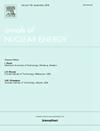基于钍/钚的耐事故燃料在VVER-1200反应堆创新燃料组件设计中的可行性评估
IF 2.3
3区 工程技术
Q1 NUCLEAR SCIENCE & TECHNOLOGY
引用次数: 0
摘要
降低放射性和有效的废物管理仍然是核工业面临的重大挑战,影响到长期安全和公众的接受程度。本研究探讨了在VVER-1200反应堆的新型毯子种子(BS)组件中使用钍-钚耐事故燃料(ATFs)的可行性。根据燃料燃耗、热功率分布、关键安全相关参数和放射性分析进行了比较评价。此外,还对储存在含硼浓度为600立方厘米的含硼水池中的乏燃料在冷却过程中放射性的衰减进行了评估。结果表明,所有BS结构都延长了反应寿命(高达~ 1750 efpd),并且由于密度更大的燃料中的原子密度更高,提高了中子经济性。BS组件消耗了种子棒中使用的大量钚。与UO2相比,钍基燃料表现出显著降低的总锕系元素和非锕系元素放射性,证明了长期废物管理的有利权衡。本文章由计算机程序翻译,如有差异,请以英文原文为准。
Feasibility Assessment of Thorium/Plutonium-Based Accident-Tolerant fuel in an Innovative fuel assembly design for the VVER-1200 reactor
Radioactivity reduction and effective waste management remain critical challenges for the nuclear industry, affecting long-term safety and public acceptance. This study explores the feasibility of employing thorium–plutonium accident-tolerant fuels (ATFs) in a novel blanket–seed (BS) assembly for the VVER-1200 reactor. Comparative evaluations were conducted based on fuel burnup, thermal power distribution, key safety-related parameters, and radioactivity analysis. Also, the decay of spent fuel radioactivity during the cooling process was assessed for fuel stored in a pool containing borated water with a boron concentration of 600 pcm. Results indicate that all BS configurations achieve extended reactivity lifetimes (up to ∼ 1750 EFPDs), and enhanced neutron economy due to higher atomic densities in denser fuels. The BS assembly consumed a significant amount of the plutonium used in the seed rods. Compared to UO2, thorium-based fuels exhibit significantly reduced total actinide and non-actinide radioactivity, demonstrating a favorable trade-off for long-term waste management.
求助全文
通过发布文献求助,成功后即可免费获取论文全文。
去求助
来源期刊

Annals of Nuclear Energy
工程技术-核科学技术
CiteScore
4.30
自引率
21.10%
发文量
632
审稿时长
7.3 months
期刊介绍:
Annals of Nuclear Energy provides an international medium for the communication of original research, ideas and developments in all areas of the field of nuclear energy science and technology. Its scope embraces nuclear fuel reserves, fuel cycles and cost, materials, processing, system and component technology (fission only), design and optimization, direct conversion of nuclear energy sources, environmental control, reactor physics, heat transfer and fluid dynamics, structural analysis, fuel management, future developments, nuclear fuel and safety, nuclear aerosol, neutron physics, computer technology (both software and hardware), risk assessment, radioactive waste disposal and reactor thermal hydraulics. Papers submitted to Annals need to demonstrate a clear link to nuclear power generation/nuclear engineering. Papers which deal with pure nuclear physics, pure health physics, imaging, or attenuation and shielding properties of concretes and various geological materials are not within the scope of the journal. Also, papers that deal with policy or economics are not within the scope of the journal.
 求助内容:
求助内容: 应助结果提醒方式:
应助结果提醒方式:


